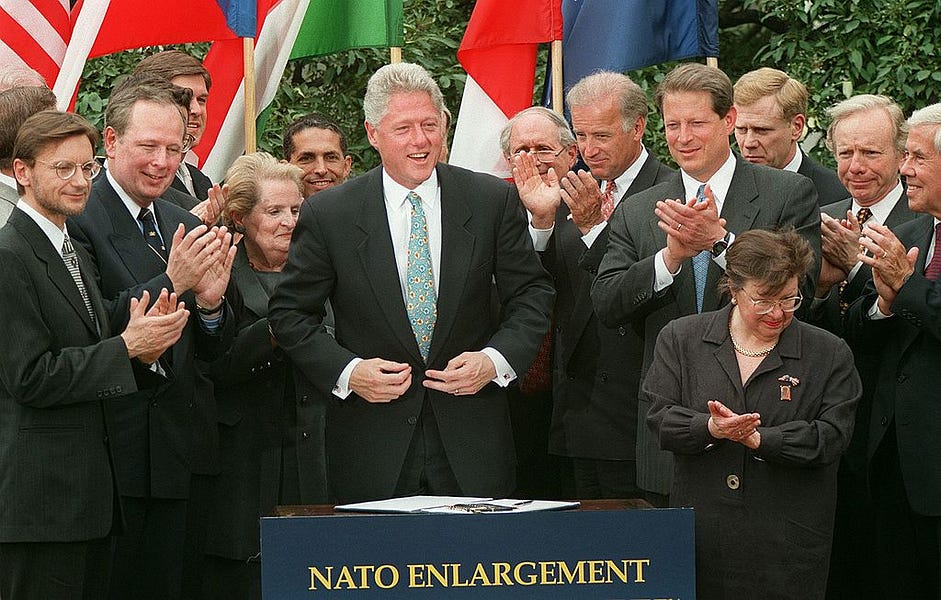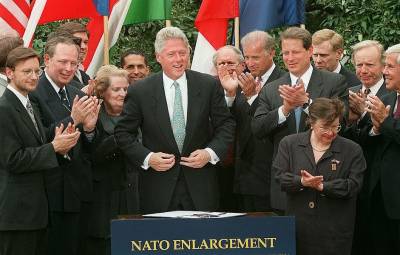Russia’s invasion of Ukraine has revived many old tropes about NATO’s successive enlargements in Eastern Europe. Critics allege that expanding NATO was provocative and humiliated Russia. Bringing Eastern Europeans into the fold also supposedly broke earlier pledges given to Soviet and Russian leadership by the George H.W. Bush administration.
The “blame NATO first” framing, apart from aping Vladimir Putin’s own messaging about the war, fails to account for the present situation in Ukraine—a country that does not have a clear path toward NATO membership. Worse yet, it is ahistorical in misrepresenting both the role played by Eastern Europeans—who were leading the effort to open up NATO membership—Americans, and Russians.
The fall of communism in Eastern Europe was not only a moment of liberation but also one of serious uncertainty. Some in the region, such as Vaclav Havel, president of Czechoslovakia and later of the Czech Republic, had initial hopes of rejoining, as Havel put it in his 1990 speech to the Polish Sejm and Senate, “a Europe as a friendly family of independent nations and democratic states, a Europe that is stabilized, not divided into blocs and pacts, a Europe that does not need the protection of superpowers, because it is capable of defending itself and building its own security system.”
Yet, it quickly became clear, including to Havel himself, that such a Europe was not an option. The collapse of communist totalitarianism laid bare myriad national antagonisms that had been frozen for decades. Havel’s own country, Czechoslovakia, disintegrated in an unexpected “velvet divorce” of 1992. Yugoslavia’s more complex breakup took a violent turn and led to the Bosnian genocide. Throughout the region, questions of ethnic minorities, language rights, and old grievances resurfaced in a dangerous fashion.
In the midst of such tensions, the USSR—and later Russia—was not a constructive actor. Moscow used violence against the Baltic states that were seeking independence. As later revelations by Kremlin insiders suggest, people connected to security and intelligence services —known colloquially as “chekists” or “siloviki” —were trying to regain control of the state in order to restore the Russian empire.
To maintain power, the tightly knit network worked together across power ministries and security services, taking advantage of Boris Yeltsin’s alcoholism and encouraging his family members to blackmail the president, as documented in Catherine Belton’s book, Putin’s People. The Kremlin maintained close ties with rogue actors, from Saddam Hussein’s regime in Iraq to Slobodan Milosevic in Serbia. Held in spasms of criminality and collapse of domestic institutions, the future of Russia was unclear. A 1993 standoff between Yeltsin and the Russian parliamentary majority was resolved by brute force, with Yeltsin ordering an attack on the parliament building. In 1996 a Communist candidate came close to retaking power.
Eastern Europeans watched with apprehension. They did not fail to notice that other multilateral institutions meant to guarantee Europe’s security, such as the Organization for Security and Cooperation in Europe (OSCE), proved ineffective in dealing with conflicts arising in places such as Nagorno Karabakh, to which both Armenia and Azerbaijan lay claim; Transnistria, a breakaway region in Moldova; or former Yugoslavia.
Critics often allege that NATO enlargements were a betrayal of a promise given by the George H.W. Bush administration to the Soviet leader Mikhail Gorbachev, that NATO would not “expand” to the east. For this, they cite a New York Times op-ed Gorbachev wrote in 2008 after Russia invaded Georgia. Yet, there is little evidence that any such a pledge was ever given to the Soviet Union. Even if it were, an informal vow would have had no bearing on future administrations. In fact, Gorbachev corrected himself in 2014, rephrasing his earlier claim to say that NATO enlargement “was definitely a violation of the spirit of the statements and assurances made to us in 1990.” (Emphasis added.) Translation: Such an assurance was never given.
To be sure, the idea of some U.S. promise to the Soviets over NATO’s enlargements is rooted in reality. But it was limited to the status of East Germany following German reunification. Incorporated into the Federal Republic of Germany, the former German Democratic Republic automatically became a NATO territory. To reassure the Soviets, the Bush administration made the pledge not to set up new NATO bases on formerly East German territories. As historian Mark Kramer noted:
These were the only times that the topic of NATO came up during Gorbachev’s lengthy negotiations with Kohl. The declassified records from all sides thus confirm that at no point, either in Baker’s discussions with Gorbachev on February 9 [1990] or in Kohl’s talks with the Soviet leader the next day, was the question of NATO enlargement beyond Germany ever discussed. Gorbachev did not seek any assurances about this matter and certainly did not receive any. The Soviet leader at this juncture was still firmly opposed to the inclusion of a united Germany in NATO and was still pushing for de facto FRG neutrality. That is where his efforts were focused. He was not yet even thinking about the possibility that, at some point in the future, several of the other East European countries might seek to join NATO.
Already in 1990 and 1991, Czech and other Eastern European officials sought out the George H.W. Bush administration, where they found some receptive if apprehensive interlocutors, Paul Wolfowitz. On a visit to Prague in April 1991, the influential Republican senator from Indiana, Richard Lugar, lent support to the idea, which was picked up, cautiously, by Bill Clinton’s presidential campaign. But it was patient work by Havel and by Poland’s freedom fighter-turned president, Lech Wałęsa, with Clinton, facilitated by the Czech-born U.S. ambassador to the U.N. (and later secretary of state) Madeleine Albright, that got the ball rolling, notwithstanding the skepticism of most American policymakers and opinion leaders.
If enlargements were demand-driven, they were also in the interest of the United States. As a State Department memorandum suggested at the time, NATO was as much a product of fear of the Russians as it was of the Europeans’ mistrust of each other—a fact that was made apparent by the simmering political instability of the 1990s. Enlargements were thus intended to prevent the kind of European rearmament that had dragged the United States into World Wars I and II.
Besides Albright, the most ardent supporters of enlargement in the Clinton administration included Anthony Lake, the national security adviser; Strobe Talbott, the deputy secretary of state; and the president himself, all of whom were sympathetic to the moral argument made by the Eastern Europeans and by the prospect a stable, democratic, and prosperous Eastern Europe, which hinged on the region’s EU accession and which, in turn, required the countries to enjoy a modicum of internal stability and security.
Yeltsin initially opposed enlargement. Eventually, he convinced President Clinton to table it until after the Russian elections in 1996. As a compromise, the Partnership for Peace (PfP) became a holdover for enlargement. Havel led the charge that PfP was acceptable as long as it was a path to membership, not a substitute, which the United States accepted. Since Russia was a PfP member, the question of Russian membership in NATO arose, too. In a speech in Moscow, President Clinton accepted the principle that any free country could join NATO, even Russia. In 1997, the two sides finally signed the NATO-Russia Founding Act in Madrid in which Russia accepted enlargement as long as there would be no permanent deployment of NATO forces to the new members’ territories. (While Russia has been in violation of this agreement since 2008, NATO remains in obedience.)
The rest is history. Without the pacifying effect of NATO membership, both the prospect of EU accession and economic prosperity seen in the region today would remain elusive. To consider a counterfactual example other than the obvious one—namely Ukraine—Georgia pursued bold economic reforms and sound policies to eradicate corruption and build Western-style institutions during much of the 2000s. Without a guarantee of its own security, the effect of such reforms proved limited—and Georgia has remained vulnerable to recurrent Russian interference.
To claim that the United States and NATO enlargement are to blame for Russian revanchism suggests an ignorance of post-communist Russia’s political history and the role imperial nostalgia and revanchism have played in it. It also denies Russian leaders agency, treating them as automatons. NATO, after all, is a defensive alliance driven by consensus, and it is unimaginable that its members would agree to invade Russia. To concede the legitimacy of Russian fears of NATO’s possible aggression is tantamount to treating them as stupid.
Finally, if Eastern European countries still lag behind their Western neighbors in terms of their prosperity and strength of their institutions, one can blame the legacy of decades of oppression dictated by Moscow. Membership in NATO and in the EU, meanwhile, has been a key reason for gradual reversal of their fortunes. Seeking to coddle the Kremlin’s sensitivities about U.S. and Western Europe-led international organizations and alliances is to dismiss the vital interests essentially all other countries of the region—most of them proven and reliable allies of the United States—and give a veto over their future to an unfriendly, revanchist regime.
Few in Eastern Europe, after all, believe that they have brought war close to their borders by sprinting to join NATO. If anything, they are grateful that their NATO membership provides them with a shield that can keep war—or rather Russian aggression—out of their countries. And that is both in their interest and in the interest of the United States.
Shay Khatiri publishes the Substack newsletter, The Russia-Iran File. Twitter:@ShayKhatiri
Dalibor Rohac is a senior fellow at the American Enterprise Institute in Washington D.C. Twitter: @DaliborRohac.






Please note that we at The Dispatch hold ourselves, our work, and our commenters to a higher standard than other places on the internet. We welcome comments that foster genuine debate or discussion—including comments critical of us or our work—but responses that include ad hominem attacks on fellow Dispatch members or are intended to stoke fear and anger may be moderated.
With your membership, you only have the ability to comment on The Morning Dispatch articles. Consider upgrading to join the conversation everywhere.